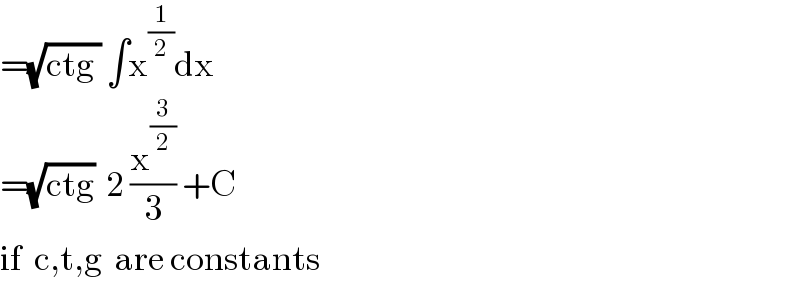
Question Number 85395 by Power last updated on 21/Mar/20

Commented by MJS last updated on 21/Mar/20

$$\mathrm{let}\:{t}=\sqrt{\mathrm{ctg}\:{x}}\:\rightarrow\:{dx}=−\mathrm{2sin}^{\mathrm{2}} \:{x}\:\sqrt{\mathrm{ctg}\:{x}} \\ $$$$\Rightarrow\:\int\sqrt{\mathrm{ctg}\:{x}}{dx}=−\mathrm{2}\int\frac{{t}^{\mathrm{2}} }{{t}^{\mathrm{4}} +\mathrm{1}}{dt} \\ $$$$\mathrm{and}\:\mathrm{this}\:\mathrm{should}\:\mathrm{be}\:\mathrm{easy} \\ $$
Answered by sakeefhasan05@gmail.com last updated on 21/Mar/20

$$=\sqrt{\mathrm{ctg}\:}\:\int\mathrm{x}^{\frac{\mathrm{1}}{\mathrm{2}}} \mathrm{dx} \\ $$$$=\sqrt{\mathrm{ctg}}\:\:\mathrm{2}\:\frac{\mathrm{x}^{\frac{\mathrm{3}}{\mathrm{2}}} }{\mathrm{3}}\:+\mathrm{C} \\ $$$$\mathrm{if}\:\:\mathrm{c},\mathrm{t},\mathrm{g}\:\:\mathrm{are}\:\mathrm{constants} \\ $$
Commented by Power last updated on 21/Mar/20

$$\int\sqrt{\mathrm{cotx}}\:\mathrm{dx} \\ $$
